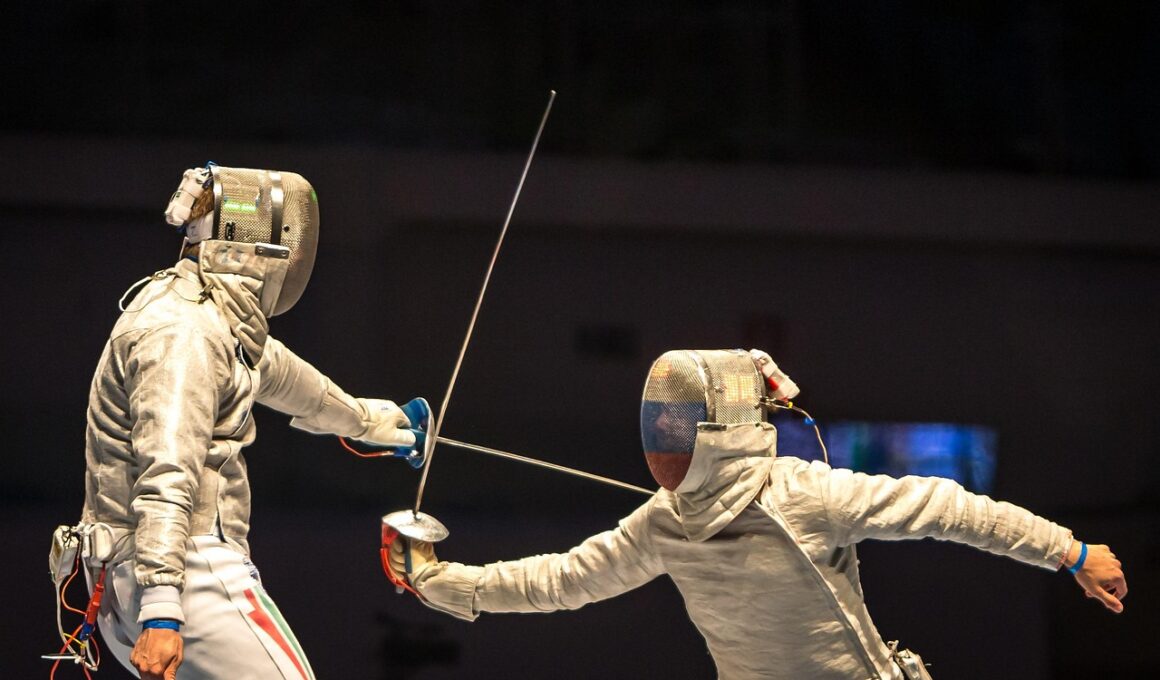How to Build Confidence in Novice Fencers
Fencing is a sport that not only requires physical prowess but also mental strength. For novice fencers, building confidence can be essential for their progress and enjoyment of the sport. Confidence allows them to trust their skills, execute strategies, and engage effectively with their opponents. One of the best ways to start is by setting realistic goals that they can achieve. These goals should be specific, measurable, attainable, relevant, and time-bound, also known as SMART goals. A coach can assist them in identifying their strengths and weaknesses, creating a focus area that fosters gradual improvement. Alongside goal setting, regular practice is fundamental, as practice helps solidify skills and boost self-esteem. Moreover, fencers should be encouraged to engage in visualization techniques, imagining themselves succeeding in various fencing scenarios. This technique has been proven to enhance performance. Positive reinforcement from coaches and fellow fencers can significantly impact a novice fencer’s confidence. They should be reminded of their accomplishments, however small, to encourage a positive mindset. Fosters a supportive team environment that celebrates achievements, which can greatly enhance confidence.
Another critical aspect of building confidence in novice fencers is through improving their technical skills. An effective coach will develop a comprehensive plan that includes footwork drills, blade work, and positioning. Individual attention can help fencers to focus on specific areas needing improvement, allowing them to progress faster. Incorporating fun and engaging drills will keep the training sessions lively and prevent novices from losing interest or becoming discouraged. Fencing is often perceived as a tactical sport; as such, teaching fencers to understand the rules and strategies can empower them to make better decisions during bouts. They need to learn how to read their opponents and anticipate their moves, which can significantly contribute to their confidence on the piste. Mock tournaments can replicate competition conditions, giving fencers a taste of real matches. This experience is invaluable, helping to ease anxiety before actual competitions. Additionally, analyzing recorded recordings of bouts allows fencers to reflect on their matches, learning from both victories and losses. Through this process, they can not only recognize patterns but also see their progress more clearly over time.
Encouragement and Support
Having a support system in place greatly enhances a novice’s confidence in fencing. Coaches should be aware of the emotional challenges faced by new fencers and be prepared to offer guidance when necessary. Constructive feedback, rather than criticism, can help build a fencer’s confidence. It is essential that fencers feel valued and accepted even when they struggle. This encouragement can come from coaches, teammates, and even family members. Peer support, such as practicing together and sharing experiences, can alleviate the pressure that challenges may present. Coaches can facilitate team-building activities to create a friendly environment, such as through workshops or group outings. Creating a sense of camaraderie will ensure novices feel less intimidated by more experienced fencers. Acknowledging all participants, regardless of their level, helps foster an inclusive atmosphere where everyone feels they belong regardless of their abilities. This safe environment will encourage novice fencers to express themselves without fear of judgment, making them more likely to take risks and try new techniques during their training.
Mental preparation is as paramount as physical preparation in sports like fencing. Novice fencers should practice mindfulness and relaxation techniques to help calm their nerves, especially before competitions. Deep breathing exercises can effectively reduce anxiety, enabling them to focus on their performance rather than their fears. Individuals can practice these techniques during training and gradually incorporate them into competitive scenarios. Alternatively, adopting a positive mantra can help to channel their energy and increase self-assurance during bouts. Repeating affirmations can rewire negative thoughts, helping to cultivate a growth mindset. This shift allows fencers to focus on improvement rather than solely on performance. As they experience successes, even small victories, their confidence will grow exponentially. Moreover, it is vital to understand that mistakes are a part of learning. Coaches should encourage novices to view failures as valuable lessons that can help inform future actions. Cultivating this mindset will promote resilience and ultimately improve their overall performance in fencing. Little by little, these practices can transform their perception of challenges and significantly enhance their confidence on the piste.
Setting Realistic Expectations
When coaching novice fencers, managing their expectations is key in building confidence. It can often be tempting for beginners to aspire to an unrealistic standard, leading to disappointment and self-doubt. Coaches should help set pragmatic expectations that acknowledge each fencer’s unique journey. Understanding the complexities of fencing, including the years of training it often requires, can lead to greater patience and understanding among novices. It is fundamental for coaches to emphasize gradual improvement over perfection. Utilizing a journal can help fencers track their achievements and challenges faced along the way, laying out a clear road map of growth and learning. Reflecting on progress can serve as a confidence booster. Celebrating milestones, such as mastering a new technique or competing in their first tournament, can also inspire motivation. Novice fencers benefit from learning that it’s the journey, with its ups and downs, that ultimately helps foster personal growth in both their skills and self-assurance. They need to remember that every successful fencer started as a novice, emphasizing perseverance and commitment in their fencing endeavors.
Educational resources can also aid novice fencers in building confidence continually. There are countless books, online videos, and tutorials available that can provide additional insights into techniques, strategies, and overall sportsmanship. Coaches should encourage their fencers to explore these resources in addition to their regular training sessions. Online communities can offer support and exchange of experiences among peers, fostering a deeper understanding of the sport. Engaging with other fencers online can provide novices with valuable advice and perspective, helping them feel they are part of a larger community. It can make the sport feel less isolating and more accessible, inspiring novices to push their boundaries. Attending workshops or seminars with experienced fencers can also offer advice and inspiration. Additionally, competitions provide essential real-life experience, so fencers should be encouraged to participate as much as possible, despite their fears. Exposure to competitive environments nurtures their ability to cope with challenges. Ultimately, continuous learning and engagement with the community will enhance their confidence and development as fencers.
Conclusion
Building confidence in novice fencers requires a multifaceted approach focused on technical skills, emotional support, mental preparation, and realistic expectations. Coaches play a crucial role in guiding their fencers by setting achievable goals and fostering a nurturing environment. Through skill development, partnerships with peers, and gradual exposure to competitive situations, novices can experience growth on multiple levels. Mental techniques such as mindfulness, along with positive reinforcement, will slowly become ingrained as essential components of their training. Fencing should be an enjoyable and rewarding journey, enabling novices to find satisfaction in their progress. Celebrating achievements, maintaining engagement with educational resources, and acknowledging that setbacks are part of the process will all contribute to long-term self-assurance. As their journey continues, novices will likely discover their unique style, embracing the spirit of fencing. A supportive community, patience, and a dedication to improvement will ensure that novice fencers can overcome their fears, build confidence, and eventually excel in this challenging yet exhilarating sport.
By following these guidelines and fostering a supportive environment, coaches can inspire novice fencers to believe in themselves and their abilities. This foundation will not only serve them in fencing but contribute positively to their overall personal development as well. Encouraging risk-taking and understanding that progress is a continuous journey will transform future fencers into confident athletes. As they reflect on their growth, novices will become more resilient in facing new challenges. This holistic approach, encompassing technical proficiency, emotional support, and a strong mindset, prepares them for a rewarding and satisfying experience in fencing, instilling the core values of perseverance and determination. Each novice can become a skilled fencer equipped with confidence and emotional intelligence, contributing to a vibrant fencing community. Ultimately, fostering self-belief will extend beyond the sport, as these lessons translate into various aspects of their lives, promoting lifelong resilience and growth.


